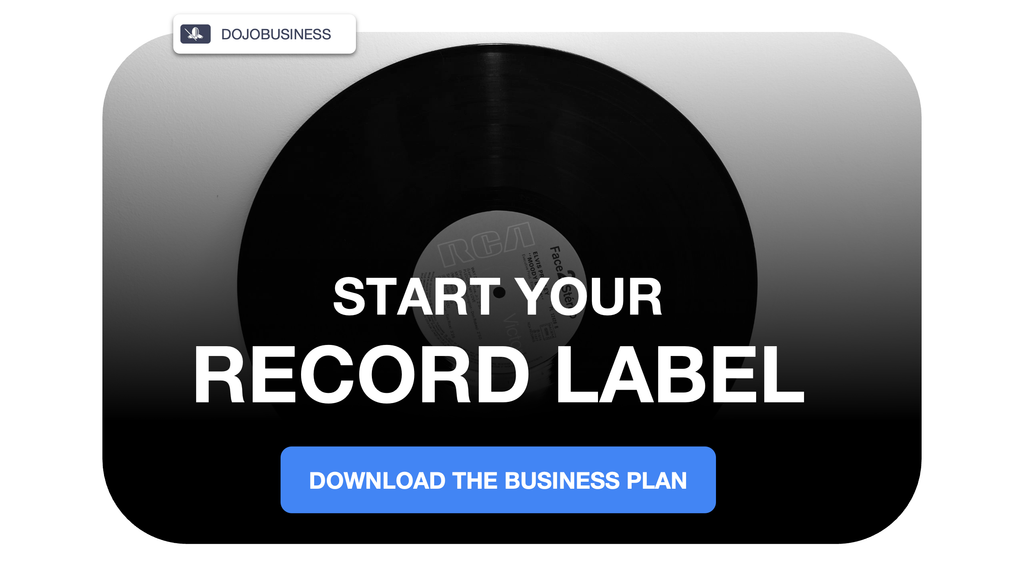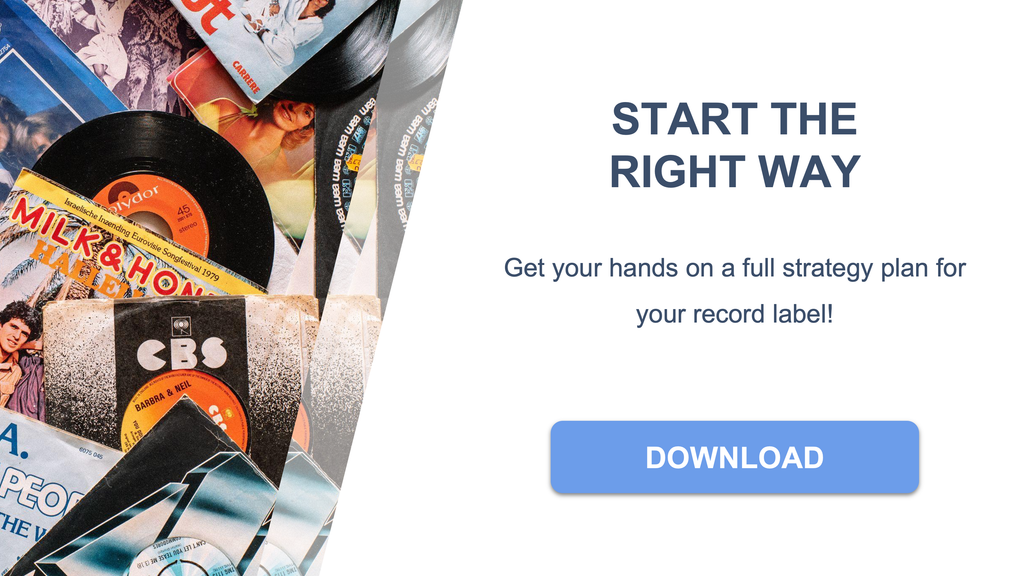Starting a record label requires clear strategic planning, a deep understanding of the industry, and a focus on operational efficiency. Below is a detailed breakdown of essential elements to consider when launching your record label business.

Our business plan for a record label will help you build a profitable project
A successful record label is built on a solid foundation of business planning, clear artist acquisition strategies, and an in-depth understanding of revenue streams. It’s important to understand the current music industry landscape, competition, and how to differentiate your label. Here’s a detailed FAQ-style guide to help you shape your record label’s business plan.
If you want to dig deeper and learn more, you can download our business plan for a record label. Also, before launching, get all the profit, revenue, and cost breakdowns you need for complete clarity with our record label financial forecast.
Launching a record label requires strategic planning, understanding of the competitive landscape, clear goals, and a solid marketing strategy. Below, we will explore the key areas of focus: mission, target market, competitive landscape, revenue model, and more.
| Key Aspect | Description | Notes |
|---|---|---|
| Mission and Vision | The label must align with the evolving needs of the music industry while incorporating artist empowerment and innovative digital platforms. | Focus on technology integration and community-driven engagement. |
| Target Audience | Genres like Pop, R&B/hip-hop, Latin, and Country are essential for growth. These genres have large and growing audiences, particularly in streaming and international markets. | Pop genre represents nearly 28% of the market share, Latin music is growing rapidly with a 8.8% CAGR. |
| Revenue Streams | Streaming, live performances, sync licensing, merchandise, and physical sales are key revenue sources. | Streaming revenue is projected at 65–68%, while merchandise and live shows provide additional income. |
| Funding Sources | Seek equity investment, bank loans, or crowdfunding to generate capital for the label’s initial years. | Raise between $500K–$2M, depending on scope. |
| Legal Framework | Ensure proper contracts, publishing rights registration, and sync rights are in place to protect both the label and artists. | Legal fees may vary, with typical costs ranging from $50K–$200K annually. |
What is the clear mission and long-term vision of the label in today’s music industry?
The label’s mission should focus on artist empowerment, global reach, and leveraging new technology like AI and data analytics.
The long-term vision involves expanding into global markets and experimenting with new revenue models like NFTs, AI-driven music, and AR/VR fan experiences.
Building a sustainable brand that is artist-first, transparent, and technologically savvy will set your label apart from traditional players.
You’ll find detailed market insights in our record label business plan, updated every quarter.
What are the specific target genres and audiences, and how large are those markets right now?
Pop, R&B/hip-hop, Latin, and country are the primary genres with the largest market shares.
Pop leads with 28% of the market, while Latin is the fastest-growing genre with a 8.8% CAGR.
The total global music market size in 2025 is estimated to be around $33.3 billion, with growth continuing in the digital space.
This is one of the strategies explained in our record label business plan.
What is the current competitive landscape of record labels in these genres, and what are their market shares?
The market is dominated by major players like Universal, Sony, and Warner, which together control over 65% of the global music industry revenue.
However, independent labels and self-releasing artists are capturing as much as 35-40% of market revenue through platforms like Bandcamp and TikTok.
Independents hold significant market share, especially in niche genres, offering opportunities for new labels to carve out a space.
We cover this exact topic in the record label business plan.
What is the unique value proposition that differentiates the label from established players and independents?
Your label’s value proposition should focus on a combination of direct-to-fan models, dynamic data-driven marketing, and flexible contracts.
Innovative revenue models like NFTs, AI content, and immersive fan experiences can also set you apart from larger labels.
Incorporating social responsibility and community engagement will further distinguish your brand.
What is the strategy for discovering, signing, and retaining artists, and how many are realistically planned to be signed each year?
Discovering artists involves leveraging AI analytics, social media curation, and influencer partnerships.
Realistically, signing 3–8 artists per year is manageable, focusing on long-term development and building strong relationships with talent.
Artist retention strategies should include transparent royalty structures and career development support.
It’s a key part of what we outline in the record label business plan.
What is the detailed revenue model, including expected percentages from streaming, physical sales, sync licensing, live performance deals, and merchandise?
The majority of a record label’s income will come from streaming (65–68%), followed by physical sales (9–11%), sync licensing (6–8%), and merchandise (16%).
Live performances will generate variable income, often through 360 deals with artists.
The revenue model should be diversified, with a strong emphasis on streaming and live events as the primary sources of income.
What are the projected costs for operations, marketing, production, distribution, and staffing over the first three years?
The first year’s operational costs will range between $250K and $400K, which will expand as the artist roster grows.
Marketing campaigns will cost between $250K and $600K, while production costs will vary from $100K to $200K.
By year three, total expenses may scale up to over $2M annually as the label expands.
What funding sources are being pursued—equity, loans, grants, or investor partnerships—and what is the targeted amount to raise?
You can seek equity investment from angel investors or venture capital, bank loans, or even crowdfunding.
Typically, a label should target raising between $500K and $2M in seed funding, depending on the scope and growth plans.
We cover this exact topic in the record label business plan.
What is the marketing and promotion strategy across digital platforms, social media, influencers, press, and touring, and what are the estimated costs and returns?
Successful promotion campaigns focus on digital platforms such as TikTok, Instagram, and YouTube Shorts, along with influencer partnerships.
Marketing and promotion will likely cost between $250K and $600K annually, with returns being measured by fan engagement, streams, and merchandise sales.
The strategy should integrate live events and direct-to-fan marketing tactics to maximize reach and engagement.
What are the distribution plans—digital aggregators, direct DSP deals, physical distributors—and what percentages do they typically retain?
Distribution typically involves digital aggregators (like DistroKid and TuneCore), which retain 10–20% of revenue, and direct DSP deals with platforms like Spotify or Apple.
Physical distributors generally retain 20–35% of sales revenue from vinyl and CD releases.
Bundling distribution with ticketing and merchandise is becoming increasingly common in the modern music industry.
What legal, copyright, and contractual frameworks are required to secure both the label’s and the artists’ interests, and what are the associated legal costs?
A solid legal framework should include artist-label contracts, publishing rights registration, and sync rights clearances.
Legal fees can range between $50K and $200K annually, depending on the label’s size and catalog.
We cover this exact topic in the record label business plan.
What are the measurable goals and milestones for the first 12, 24, and 36 months, and what KPIs will be tracked to evaluate success?
Key goals include building a roster of 3–8 artists within the first 12 months and hitting 1M+ cumulative streams.
By 24 months, breakeven should be reached, with 10–15 artists and first chart placements.
By 36 months, the label should have 20+ artists, a sustainable revenue mix from streaming, sync, and merchandise, and expansion into new regional markets.
Conclusion
This article is for informational purposes only and should not be considered financial advice. Readers are encouraged to consult with a qualified professional before making any investment decisions. We accept no liability for any actions taken based on the information provided.
Related Articles:


